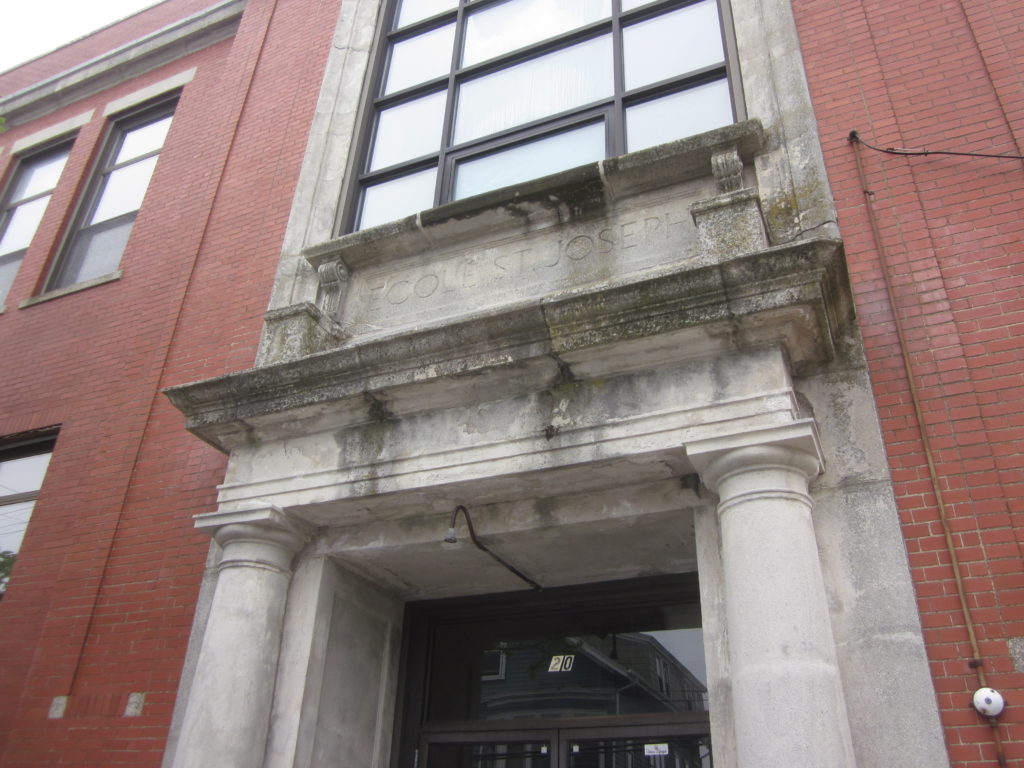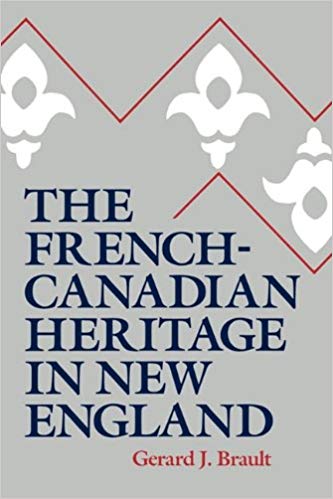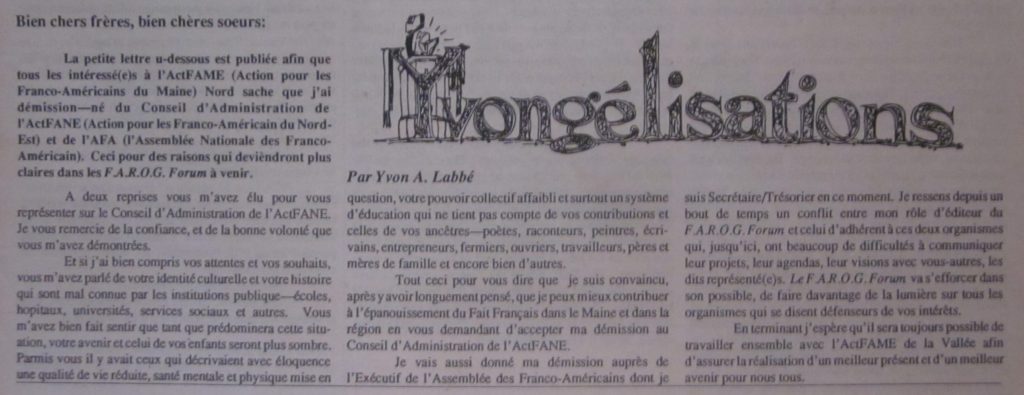Making Connections
By the end of the 1980s, the Forum had broadened its horizons considerably by bringing in more voices and carrying items from other publications. (For background, see last week’s post.) It still included genealogical content and poetry—and in 1988 its pages captured new perspectives with short texts by Fort Kent high school students. Some correspondents weighed in on free trade and the conservatism of the Reagan years. Others took advantage of the twentieth anniversary of Martin Luther King’s tragic death to reflect on the limitations of the civil rights movement.
What is most striking, perhaps, in issues from this period is the sheer concern with the past. Contributors continued to pay tribute to those who came before, as in an homage to the late Napoléon Marcou, dead at 99, an attorney and veteran involved in cultural preservation as well as in Waterville’s civic life. In March, Marcelle Guérette-Fréchette offered a different kind of tribute. In “Requiem for a Franco-American Parish,” she addressed the final days of Precious Blood Church in Holyoke. An aging population, youths’ defection from the Church, and the changing character of the neighborhood due to immigration had gotten the better of this ethnic parish.

Historical interpretation played a part in a lively debate (from one issue to the next) between Forum correspondents R. H. Turcotte and Francis Pelletier of Salem, Massachusetts. Responding to a prior letter by Turcotte, Pelletier argued that there had been no “severe discrimination” in Salem. Franco-Americans had been represented in all lines of work as well as in politics. He had not personally felt disadvantages to being French in Salem in his lifetime. Turcotte (“a psychiatrist for forty years and an expert on ethnic neurosis”) answered by emphasizing the political success of other ethnic groups in New England as compared to Franco-Americans’. He underscored the legacy of marginalization by calling himself a “N—– of the North” and Pelletier a “dumb frog”; his counterpart, he claimed, was simply in denial. Turcotte suggested that he join George André Lussier’s Comité pour l’avancement du français en Amérique. Quebec independence might help Pelletier address his inferiority complex, Turcotte claimed.
The historical contents of the Forum were, in this period, hardly ever so polemical or personal. A discussion of discrimination more in keeping with the style and tone of the paper was a reprint from Vermont Life; the article rested on the research of André Sénécal and Peter Woolfson of the University of Vermont. This was a somewhat anthropological portrait on cultural preservation and the limited visibility of Franco-Americans, despite 37 percent of Vermonters claiming French descent at the last census.
Much of the historical work in the pages of the Forum was, naturally, Maine-oriented. A reprint from The Church World noted the lack of recognition of Maine’s French origins; in a piece originally published in the Lewiston Sun Journal, Yves Frenette, then a visiting assistant professor at Bates College, offered an overview of his dissertation research. Maurice Violette and Marc Chassé submitted original texts. The editors also found space for articles on the Huguenots and the French Canadians of the Midwest.
In a more argumentative article, in April, Richard Fortin of Madison, N.H., discussed the francophones who proselytized on behalf of the Methodist Episcopal Church in Manchester. He believed that historians ought to study Franco-Americans who preserved part of their identity while leaving the Catholic Church:
It is safe to say that these Franco-Americans[,] their history and accomplishments will not be found in the annals of ‘La Société Historique Franco-Américaine’ . . . these Franco-Americans were just as anti-catholic [sic] as their adversaries were anti-protestant [sic] and the invective was very intense, they were in serious competition for peoples [sic] minds, but the efforts should not be hidden because they did not fit the stereo-type [sic] of what some of our so-called leaders would like to see.
Several texts revealed that Franco-American history had finally earned its proper place in academic research. Gerard J. Brault had recently written the first synthesis of Franco-American history since Robert Rumilly’s more than a generation earlier. The Forum printed Brault’s thoughts on the fractures that prevent strong, unified movements from forming—including references to the “maverick” group at the University of Maine. Dean Louder reviewed Textes de l’Exode, an edited collection that might address the need for better mutual understanding between Francos and Quebeckers. In a second piece, just as the Ellis Island museum was soliciting information on Franco-Americans to offer a broader view of immigration, Louder argued for an inclusive continental perspective in research.

At last, the Forum shared work first published in an academic journal in 1985, in which Jill M. Bystydzienski compared the lives of French-Canadian and African-American women in North America. Bystydzienski argued that the gender struggle typically took a backseat to the struggle for ethnic and racial equality. Women’s common front against sexism was undermined by class differences and attachment to the traditional family unit, which was seen not as a source of oppression, but of strength, for minority groups. In the wake of ethnic and racial awakening, it was more than ever possible for women to overcome their cultural and class differences.
Of course, as Bystydzienski’s work suggested, such extensive historical research and interest were not severed from present-day cultural advocacy. The Forum of 1988 still reflected great fervor in the defense of French minority rights. The paper carried news of the Louisiana congressional delegation’s introduction of a constitutional amendment asserting “the right of all Americans to maintain and foster their cultural heritage.” A similar sentiment, with its distinctive Franco-American twist, was apparent in a contribution by Denis Baillargeon of Connecticut in March:
Many Franco-Americans still feel inferior because of the Collective Unconscious experience of the pas[t] six hundred years. After Joan of Arc’s triumph, the most uplifting event in the last 600 years of the Franco-American Collective Unconscious was the brave actions of the Patriotes of 1837-1838. It is for that reason that I travelled to St. Denis [in Quebec] last November 21st and 22nd to pay my respects to the Patroites [sic] of 1837-1838 on the 150th anniversary of that glorious revolution. I was accompanied by my daughter, Danielle, and Mr. and Mrs. Roger Lacerte. We went as representatives of CAFA—Le Comité pour l’Avancement du Français en Amérique,—whose purpose is to promote the Franco-American cause through the fostering of Québec’s independence from Canada.
Indeed, the activism of the 1970s had not vanished—but overall, in 1988, it had softer edges. It was less irreverent and subversive, and Forum issues reflected that. In February, managing editor Rhéa Côté Robbins argued that with a changing economy, a certain Franco-American view that only manual labor is real work must change. The time had come to “migrate” in growing numbers into the university system. The barrier to college education was not only financial and linguistic, but one of perception too. Meanwhile, a regular column by “Ti-Froc” called for decentralization, openness, and an expanded role for the laity within the Catholic Church. The author wished to see Catholicism “address real moral issues, such as war, poverty, enslavement and put less emphasis in its moral teaching upon who is sleeping with whom.”
This reaction to the past—in the form of conservative mindsets and clerical authority—also entailed opposition to old elites. In March, a correspondent asked why Yvon Labbé, Paul Paré, Barney Bérubé, and others had resigned from ActFANE. The next month, Richard Fortin congratulated Labbé on his resignation from both this group and the Assemblée des Franco-Américains. According to Fortin,
these groups were founded by progressive Franco men and women who saw how the traditional groups like Le Comité de Vie, Le Conseil de la Vie Française and their fellow travelers were throttling and literally killing any new thinking in the fast changing needs of those they pretended to speak for.
These new thinkers, wanted to see more openness, with a freer discussion of new ideas and less of Holy Mother the Church, Le Français Standard, and the awarding of medals, [and] for a brief moment there was hope but slowly and steadily the advocates for a new think [sic] started leaving, sick of hearing the same old reasons for the doing the same old things[,] clinging to the past and refusing to face the realities. La Même Maudite Gang (MMG) were so fearful of losing control that they continually stood in the door of progress, dragging these two groups down to their level of stagnation and do-nothingness.
Two more matters elicited significant attention from Forum readers, correspondents, and columnists in 1988. One was the perpetual question of linguistic preservation. Madeleine Giguère discussed a telephone survey and efforts to secure French television programming (perhaps from Radio-Canada) for Mainers and Paul Gutman, under pen name “Blé d’Inde,” rebutted the notion that Canadian French is inferior or that anglicisms must be shunned at all costs.
Maine French was at least good enough for Harry L. Heintzen of Voice of America. Heintzen explained that he had found “gold” in Maine; he wrote of plans to establish a VOA institute to train French-language, African journalists, which could utilize the resources of the Franco-American community.
Yet in the prior ten years there had been cause to grow increasingly concerned about language policy and funding for bilingual endeavors. Writing on the matter, J. David Edwards was not entirely pessimistic, but, in the Reagan era, funding for international and minority-language education was wrapped up in economic imperatives and competitiveness. Edwards expected tough shoals ahead in the form of education funding cuts. Michael J. Guignard added that fiscal conservatism was not the only obstacle. He wrote about the goals and activities of U.S. English, an organization intent on making English the country’s official language. Supporters of bilingual education might have to form a similar one-issue lobbying group.

U.S. English gave evidence of a cultural backlash which at its most extreme took the form of a revival of the Ku Klux Klan. Speaker of the House John L. Martin addressed an alleged Klan rally in Mexico, Maine, in his regular column, and emphasized the importance of forming a common front against hate.
Suzanne Fournier Hendrick deplored the absence of a Franco voice at a recent anti-KKK rally, for the group had preyed on Francos in Rumford, Chisholm, and other locations. It was a telling fact of recent history that now Catholics were members of the Klan, which chiefly targeted African Americans in Maine. Franco-Americans had escaped from the most difficult period of their history; visible minorities still continually faced white oppression and violence.
Next week: Le Forum in 1998: “In the Mainstream”
Leave a Reply